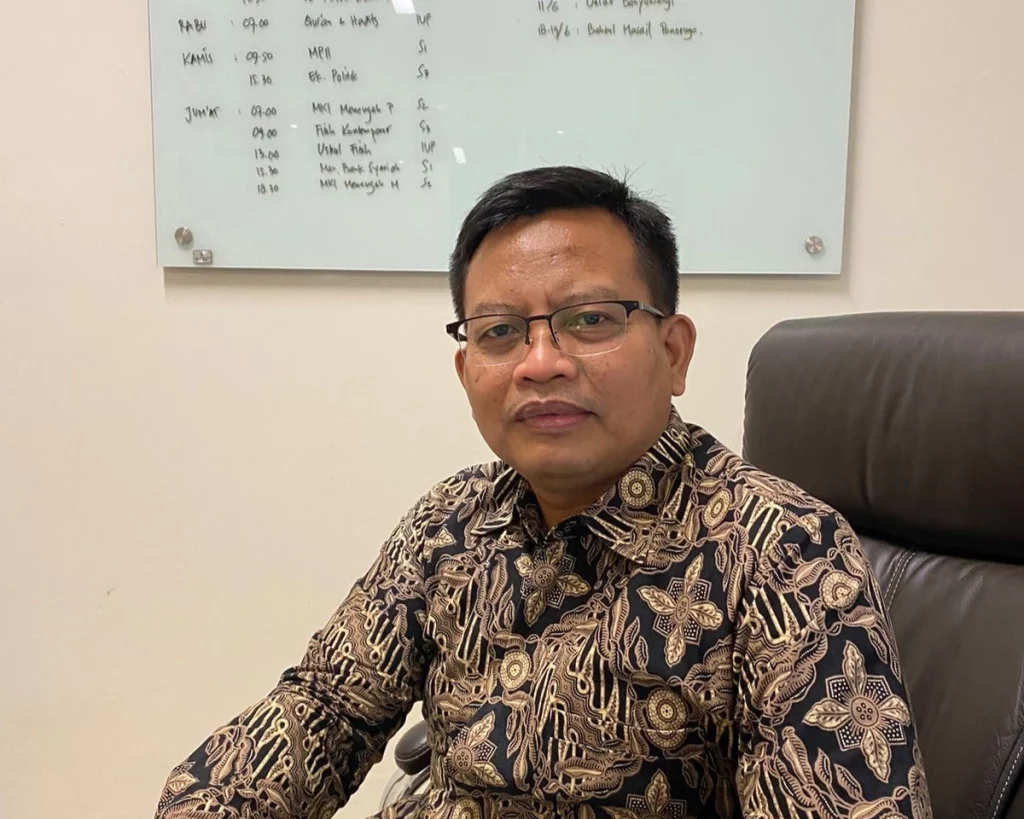UNAIR NEWS – The term “SGIE” became a talking point at the water cooler during the election debate, on Friday, December 22, 2023. Vice presidential candidate Gibran Rakabuming Raka raised a question to his rival, Muhaimin Iskandar about how to improve Indonesia’s ranking in SGIE. Gibran’s discussion about SGIE in the debate piqued the attention of the society, including Dr. Imron Mawardi SP MSi, an expert in Sharia Economics from the Faculty of Economics and Business Universitas Airlangga.
SGIE or SGIER stands for State of the Global Islamic Economy Report. It is an official report released by DinarStandard, a research institution based in Dubai. Imron revealed that DinarStandard frequently assesses the progress of the Islamic economy worldwide. Approximately 80 countries are included in the evaluation within the SGIE Report.
The SGIE Report includes six indicators: 1) Islamic finance, 2) halal food, 3) halal vision, 4) halal tourism or Muslim-friendly tourism, 5) halal pharmacy and cosmetics, and 6) halal media and recreation.
“Six indicators are used to capture the Sharia economic index in various countries. About 80 countries are evaluated by the Global Standard or the Global Islamic Economy Index (GIEI),” he said.
Apart from GIEI, several other organizations—including Thomson Reuters, Islamic Financial Report, etc.—have published publications on the development of Sharia economics worldwide.
Indonesia on the SGIER
Further, Imron underlined Indonesia’s position on the SGIER in the past five years. He believed Indonesia has a good trend position, as seen by its steadily improving ranking.
“In 2018, Indonesia was ranked 10th, then climbed into the top five in 2019. In 2022, Indonesia reached the fourth position, and most recently this year, it has listed the top three,” he said.
Despite achieving the third position with a 68.5 index score in the SGIER 2023, Imron noted that the score is still far behind Malaysia, which has achieved 220 as the top rank.
The score disparity is due to Indonesia’s greater focus on marketing rather than production within the halal economy. “In the research conducted by DinarStandard, the focus is not limited to marketing alone, but also on how a country supports the halal economy,” he said.
From those indicators, Indonesia has varied rankings. “In terms of halal vision, Indonesia ranks 3rd place. In halal food, ranks 4th place, followed by media and recreation in 5th place. In halal pharmacy and cosmetics, Islamic finance, and Muslim-friendly tourism, we are in 6th place,” he said.
Within the top 10 in each indicator, Imron expected that Indonesia would be able to take advantage of all available prospects and not be limited to the product market.
“If Indonesia wants to maintain consistency, it should maximize opportunities. For example, the most potential area is the halal food sector. Looking at the size of business in the global halal market, where about 62 percent is halal food production, Indonesia should ideally maximize its contribution as a producer,” the Sharia Economy expert said.

Challenges and Opportunities for Indonesia’s Economy
Furthermore, Imron suggested the need for improvements in infrastructure and the enforcement of regulations to support these potentials.
“Indonesia has formulated the Halal Product Assurance Law (UU JPH), but it has not been fully realized. The UU JPH is a supporting tool in enhancing the capacity of Indonesia’s halal products. Indonesia can increase its production contribution by doing this. I think the government should be concerned about reinforcing regulations to increase Indonesia’s contribution to the global halal industry,” he said.
In line with the regulations, infrastructure is also an important sector in driving Indonesia to become a global producer of halal products. He cited an example of a meat-based product that still has limited halal certification. In the field of halal tourism, good infrastructure facilitates accessibility to tourist destinations.
Imron also highlighted the importance of cooperation with Islamic countries. He recommended that the government work with several countries that sell halal goods in B2B (business to business), G2G (government to government), industry, or B2G (business to government) partnerships.
“For instance, Saudi Arabia has a strong psychological connection with Indonesia, given that our country is the largest contributor to Hajj and Umrah pilgrims. Unfortunately, Indonesia has not yet become a producer of halal products there. We have a significant role in our relations with Saudi Arabia,” he said.
Imron revealed that the prospects of the global halal market continue to rise each year. “We see that its development has a fairly high average. DinarStandard reported that the media sector experienced a growth of 92 percent, tourism increased by about 13.1 percent, and halal food grew by 58.5 percent,” he said.
Furthermore, the trend of Islamic consumer spending has reached 1.62 trillion US dollars in 2022 and escalating to 2.29 trillion US dollars within ten years. This notable rise in Islamic consumer purchasing, Imron believed, may provide fresh prospects for economic expansion in Indonesia.
Author: Aidatul Fitriyah
Editor: Khefti Al Mawalia









